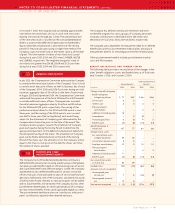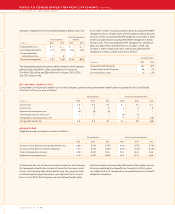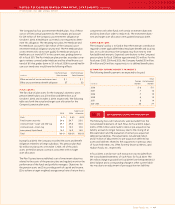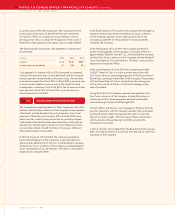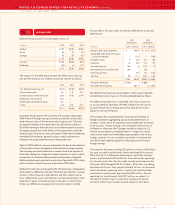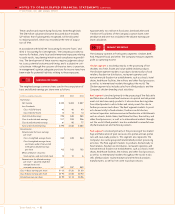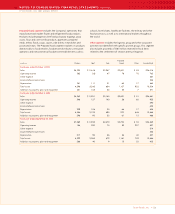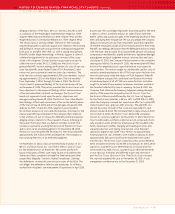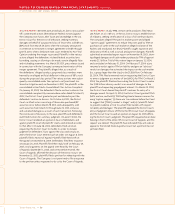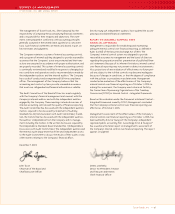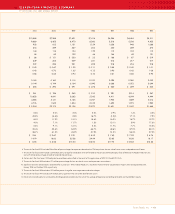Tyson Foods 2005 Annual Report Download - page 59
Download and view the complete annual report
Please find page 59 of the 2005 Tyson Foods annual report below. You can navigate through the pages in the report by either clicking on the pages listed below, or by using the keyword search tool below to find specific information within the annual report.
>> NOTES TO CONSOLIDATED FINANCIAL STATEMENTS (CONTINUED)
TYSON FOODS, INC. 2005 ANNUAL REPORT
>>>>>>>>>>>>>>>>
>>>>>>>>>>>>>>>>
Tyson Foods, Inc. >> 57
alleging violations of the FLSA, 29 U.S.C. Sections 201–219, as well
as violations of the Washington State Minimum Wage Act, RCW
chapter 49.46, Industrial Welfare Act, RCW chapter 49.12, and the
Wage Deductions-Contribution-Rebates Act, RCW chapter 49.52.
The Chavez lawsuit similarly alleges TFM and/or the Company
required employees to perform unpaid work related to the donning
and doffing of certain personal protective clothing and equipment,
both prior to and after their shifts, as well as during meal periods.
Plaintiffs further allege the holdings in Alvarez support a claim of
collateral estoppel and/or res judicata as to many of the issues
raised in this litigation. Chavez initially was pursued as an opt-in,
collective action under 29 U.S.C. 216(b), but the District Court
granted Plaintiff’s motion seeking certification of a class of opt-out,
state law plaintiffs under Federal Rule of Civil Procedure 23 and
notice was sent to potential state law claim class members. The
state-law class contains approximately 3,900 class members, includ-
ing approximately 1,200 on the federal claim. The trial was held
from September 7, 2004, through October 4, 2004. The District
Court issued its proposed findings of fact and conclusions of law
on December 8, 2004. The parties provided the District Court with
their objections to the proposed findings of fact and conclusions
of law and submitted trial briefs on damages. The District Court
heard oral arguments based upon the party’s objections and
damages briefings March 29, 2005. The District Court then filed its
final findings of facts and conclusions of law on the liability phase
of the trial on May 18, 2005 and on the damages on June 28, 2005
and July 14, 2005. On July 20, 2005, judgment was entered for
$11.4 million, exclusive of costs and attorney fees. Attorneys for the
Chavez plaintiffs have indicated to the Company their intention
to file a follow-on suit to Chavez for different potential claimants
alleging similar violations to those raised in Chavez. A hearing on
the award of attorney’s fees was held on October 31, 2005. The
Company is presently awaiting the decision of the District Court
and its entry of an amended judgment. On November 28, 2005,
the District Court awarded the attorneys for the Chavez plaintiffs
approximately $1.9 million in fees and expenses. The Company is
now awaiting the entry of an Amended Judgment.
On November 21, 2002, a lawsuit entitled Emily D. Jordan, et al. v.
IBP, inc. and Tyson Foods, Inc., was filed in the U.S. District Court
for the Middle District of Tennessee. Ten current and former
hourly employees of TFM’s case-ready facility in Goodlettsville,
Tennessee, filed a complaint on behalf of themselves and other
unspecified, allegedly “similarly situated” employees, claiming
the defendants violated the overtime provisions of the FLSA. The
suit alleges the defendants failed to pay employees for all hours
worked from the plant’s commencement of operations in April 2001.
In particular, the suit alleges employees should be paid for the time
it takes to collect, assemble and put on, take off and wash their
health, safety and production gear at the beginning and end of their
shifts and during their meal period. The suit also alleges the Company
deducts 30 minutes per day from employees’ paychecks regardless
of whether employees obtain a full 30-minute period for their meal.
Plaintiffs are seeking a declaration that the defendants did not comply
with the FLSA, and an award for an unspecified amount of back pay
compensation and benefits, unpaid entitlements, liquidated damages,
prejudgment and post-judgment interest, attorney fees and costs.
On January 15, 2003, the Company filed an answer to the complaint
denying any liability. On January 14, 2003, the named plaintiffs filed
a motion for expedited court-supervised notice to prospective
class members. The motion sought to conditionally certify a class of
similarly situated employees at all of TFM’s non-union facilities that
were not previously made the subject of FLSA litigation. Plaintiffs
then withdrew a request for conditional certification of similarly
situated employees at all of TFM’s non-union facilities and rather
sought to include all non-exempt employees who have worked at
the Goodlettsville facility since its opening. On June 9, 2003, the
Company filed a Motion for Summary Judgment seeking the appli-
cability of the injunction entered by the U.S. District Court for
the District of Kansas and affirmed by the U.S. Court of Appeals
for the Tenth Circuit (Metzler v. IBP, inc. 127 F. 3rd 959, 10th Cir. 1997),
which the Company contends has a preclusive effect as to plaintiffs’
claims based on pre- and post-shift activities. The plaintiffs con-
ducted discovery limited to that issue and responded to said
Motion on June 18, 2004. The Company filed its reply on July 2, 2004.
On October 12, 2004, the District Court denied the Company’s
motion for summary judgment. On November 17, 2003, the District
Court conditionally certified a collective action composed of simi-
larly situated current and former employees at the Goodlettsville
facility based upon clothes changing and washing activities and
unpaid production work during meal periods, since the plant
operations began in April 2001. Class Notices to approximately
4,500 prospective class members were mailed on January 21, 2004.
Approximately 525 current and former employees have opted
into the class. The District Court stayed discovery on November 8,
2004, and administratively closed the action January 21, 2005, pend-
ing the U.S. Supreme Court’s determinations in Alvarez and Tum.
On November 8, 2005, the U.S. Supreme Court affirmed the Ninth
Circuit decision in Alvarez and affirmed in part and reversed in
part the First Circuit decision in Tum. The District Court vacated
the stay and reopened the case on November 16, 2005. A case
management conference was set for December 21, 2005.


